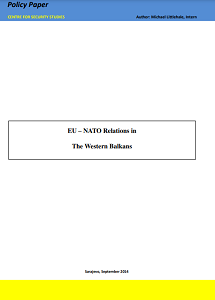EU - NATO Relations in The Western Balkans
EU - NATO Relations in The Western Balkans
Author(s): Michael Littlehale
Subject(s): Politics, Regional Geography, International relations/trade, Security and defense, EU-Approach / EU-Accession / EU-Development
Published by: Centar za Sigurnosne Studije
Keywords: EU; NATO; relations; Western Balkans; Security;
Summary/Abstract: The conflicts that emerged amidst the breakup of Yugoslavia in “Europe’s backyard” occurred at a pivotal time. The Cold War had come to an end, and the North Atlantic Treaty Association (NATO) was forced to rethink its fundamental purpose after the dissolution of the Warsaw Pact. Additionally, Europe was starting to show signs of acting as a more unified, independent security actor. Despite then president of the Council of the European Union Jacques Poos (foreign minister, Luxembourg) characterizing the conflict as the “hour of Europe” at the beginning of the breakup of Yugoslavia in 1992, it would ultimately take NATO air strikes and US led negotiations to come to a peace deal, which is still in place today. As such, both the European Union (EU) and NATO remain heavily involved in Bosnia and Herzegovina (BiH), and other parts of the region, to this day. This involvement has shifted from military intervention to peacekeeping, stabilization, and finally towards further democratization and integration into Euro-Atlantic institutions. All of this has occurred within the complex and evolving relationship between the EU and NATO. At the same time that the two organizations were adapting to the changing security environment of the 1990s and dealing with the type of conflict brought on by the breakup of Yugoslavia, the EU was also growing as a security actor alongside NATO. It became apparent that closer cooperation in security and defense between the two organizations would be a vital element of relations moving forward. How have EU-NATO relations developed over this time, especially in the context of the post conflict region of the western Balkans? This paper will look at the development of relations between these two organizations, and how institutional cooperation agreements came about largely from deficiency in dealing with events in the Balkans, in addition to being put into practice for the first time in the western Balkans. How cooperation has continued to develop in a political and security capacity since the 1990s will shed light on the current EU and NATO policy in the region, as well as the implications of their cooperation has on the latest threats to security in Europe. It is clear, given the recent conflict in Ukraine, that cooperation between the EU and NATO has a renewed importance and urgency to further develop. This paper will outline past examples of successful cooperation in relevant operations (that is, in meeting security issues on the continent) in the western Balkans, and show the implications this has in moving forward. In doing so, the initial international response to the breakup of Yugoslavia will briefly be reviewed, and the subsequent involvement of NATO and Europe to these conflicts in the 1990s. This leads to US/NATO efforts that finally brought the warring parties to the table, and Europe’s increasing involvement as NATO phased out its operations. The evolution of institutional and operational dynamics of cooperation between the EU and NATO will then be examined before focusing on this relationship in regards to the western Balkans, and the impact it has had on the region - both positive and negative - to date. The paper will conclude with the lessons drawn and the implications for EU and NATO relations’ moving forward, as conflict once again has emerged on the European continent.
Series: Centar za Sigurnosne Studije - POLICY PAPER
- Page Count: 16
- Publication Year: 2014
- Language: English
- Content File-PDF
- Introduction

